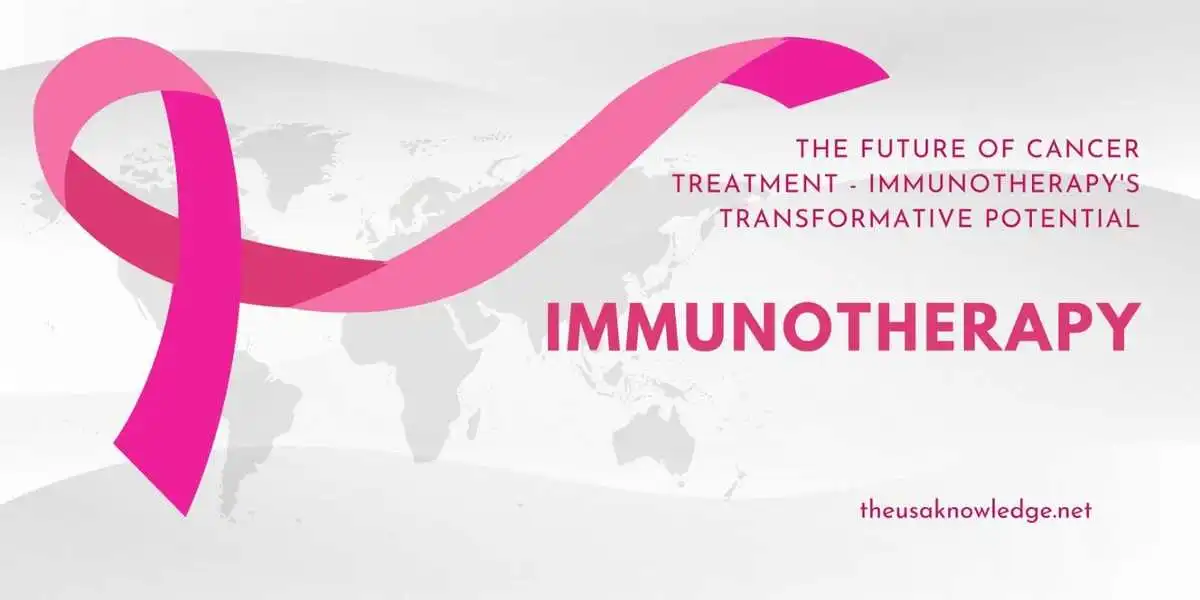Immunotherapy represents an exciting new frontier in cancer treatment. It involves harnessing the power of the body’s own immune system to seek out and destroy cancer cells. Unlike chemotherapy or radiation which directly attack tumors, immunotherapy helps train the immune cells to recognize markers on cancer cells and boosts their killing capability. This enables a more targeted, long-lasting, and effective anti-cancer response with better tolerance.
After decades of research, immunotherapy has now emerged as a revolutionary approach against certain types of cancers. In some cases, it has led to complete and durable remission. While still early days, immunotherapy promises to change the face of cancer treatment as more applications are found across various cancer types. In this blog, we explore the different types of immunotherapies, their mechanisms of action, current uses in cancer treatment, limitations, and the exciting future possibilities of this transformative therapy.
Read – Managing Fevers in Children During COVID-19: A Parent’s Guide.
Types of Immunotherapies

Monoclonal Antibodies
These laboratory-produced molecules are engineered to target specific antigens found on cancer cells. By binding to these antigens, monoclonal antibodies can flag cancer cells for destruction by the immune system. They can also block proteins that cancer cells use to grow and spread. Examples include rituximab, trastuzumab, cetuximab.
Checkpoint Inhibitors
There are certain proteins like PD-1, PD-L1, and CTLA-4 that act as immune checkpoints, preventing T-cells from attacking cancer. Checkpoint inhibitor drugs block these proteins and take the brakes off the immune system, enabling it to recognize and eliminate tumor cells. These include pembrolizumab, nivolumab, ipilimumab.
Cancer Vaccines
These therapies boost the immune system’s ability to detect and destroy cancer cells by exposing it to tumor-specific antigens or genetically modified immune cells programmed to recognize cancer. Examples are sipuleucel-T and T-VEC.
Adoptive Cell Transfer
This involves extracting a patient’s T-cells, genetically modifying them to enhance their cancer-fighting ability, growing more of them in the lab, and transfusing them back into the patient to attack the tumor. CAR T-cell therapy is a revolutionary form of this.
Cytokines
These are proteins like interferons and interleukins that occur naturally in the body and can stimulate an immune response. High doses of cytokines like IL-2 can be administered to boost anti-cancer immune activity.
Dendritic Cell Therapy
Dendritic cells are key antigen-presenting cells of the immune system. This approach involves isolating patient’s dendritic cells, loading them with tumor antigens and reinfusing to induce a wider immune reaction.
Mechanisms and Targets
Immunotherapies exert anti-tumor effects through various mechanisms at the molecular and cellular level:
- Checkpoint inhibitors work by blocking proteins that inhibit T-cell response, thereby removing restraints on the immune system and allowing T-cells to proliferate and kill cancer cells.
- Cancer vaccines introduce tumor antigens to the immune system. This activates helper T cells and cytotoxic T cells that can now recognize and attack cancer cells containing these antigens.
- Adoptive cell transfer involves engineering patient’s own T-cells to create receptors on their surface that recognize specific tumor antigens. These enhanced CAR T-cells can now detect and destroy cancer cells efficiently.
- Monoclonal antibodies bind to target proteins on cancer cells, flagging them for destruction. They also block proteins that cancer cells need for growth and survival.
- Cytokines like IL-2 stimulate activity and growth of T-cells, NK cells and macrophages – key players in anti-tumor immune response.
Some of the specific molecules targeted by immunotherapies include:
- PD-1/PD-L1: Checkpoint proteins that suppress T cell response.
- CTLA-4: Checkpoint protein that downregulates T cell function.
- CD19: Expressed on B cell lymphomas, targeted by CAR T-cell therapy.
- EGFR: Protein that promotes cancer cell growth, blocked by cetuximab.
- HER2: Receptor overexpressed in breast and gastric cancer, targeted by trastuzumab.
- IDO: Immunosuppressive enzyme blocked to enhance T cell activity.
By targeting these critical regulators of immune response to cancer, immunotherapies augment the natural defenses of the body to attack malignant cells across multiple pathways.
Current Applications
Immunotherapies have shown tremendous success against certain cancers, especially melanoma, non-small cell lung cancer (NSCLC), lymphomas, leukemia, head and neck cancers, and kidney cancer.
Some examples:
- Checkpoint inhibitors like pembrolizumab, nivolumab block PD-1/PD-L1 proteins to boost immune response against melanoma, NSCLC, head and neck cancers, bladder cancer, and Hodgkin’s lymphoma.
- CAR T-cell therapy has led to long-lasting remissions in certain blood cancers like lymphoma and leukemia, where T-cells are engineered to target CD19 antigen on cancerous B cells.
- Monoclonal antibodies cetuximab, panitumumab, block EGFR pathway in colorectal cancer, while trastuzumab targets HER2 protein in breast and gastric cancers.
- Immunotherapy with IL-2 has been effective in patients with metastatic melanoma and renal cell carcinoma.
- Cancer vaccines sipuleucel-T and T-VEC improve immune response against metastatic prostate cancer and melanoma respectively.
- Combination immunotherapies, e.g. nivolumab plus ipilimumab show higher response rates in melanoma patients than single drugs alone.
In many cases, immunotherapies have achieved significantly improved patient survival compared to chemotherapy. Ongoing clinical trials are focused on expanding the use of these agents across cancer types and stages of diagnosis. Research is also focused on finding predictive biomarkers to identify patients most likely to benefit.
Limitations and Challenges
Despite the tremendous promise, there are some limitations of current immunotherapies:
- Dangerous side effects like colitis, hepatitis, hypophysitis, arthritis are possible with checkpoint inhibitors due to overactivation of immune response. Careful patient monitoring is required.
- High costs of novel immunotherapies can limit access. For instance, CAR T-cell therapy costs over $350,000 per patient. Combination treatments add further costs.
- Immunotherapies don’t work for all cancer types – brain, pancreatic and prostate cancers are resistant. Appropriate tumor microenvironment is required.
- Patients can develop resistance to immunotherapy after an initial response. Understanding resistance mechanisms using biomarkers is important.
- Optimal combinations with chemotherapy, radiation, and targeted therapy are still being determined to maximize efficacy.
- Robust biomarkers are needed to identify patients most likely to respond to immunotherapy.
Despite these challenges, researchers are working to improve patient selection, find optimal combinational therapies, increase response rates, manage side effects, and expand immunotherapy options across cancer types.
The Future of Immunotherapy
An exciting future lies ahead for immunotherapy as research strives to unlock its full potential against cancer.
Some promising directions include:
- Using immunotherapy as first line treatment and even adjuvant therapy to prevent recurrence and improve cure rates with common cancers like triple negative breast cancer.
- Combining multiple immune targets and therapies like PD-1 and CTLA-4 inhibitors to improve response rates.
- Developing CAR T-cells against more tumor antigens beyond CD19, such as mesothelin.
- Coupling immunotherapy with targeted drugs that modify tumor microenvironment to make it more susceptible to immune attack.
- Using immunotherapy in earlier stage disease and even before surgery in neoadjuvant setting to shrink tumors.
- Identifying predictive biomarkers through tumor mutational load assessment, interferon signaling, gene expression profiling etc. to select patients.
- Managing side effects better through deceased dosing, improved patient monitoring and steroid regimens.
As research advances, immunotherapy promises to become an integral component of treatment for many major cancers, leading to better long-term outcomes for patients. The future is bright for immunotherapy to completely transform the landscape of cancer treatment in the coming decades.
Immunotherapy represents one of the most exciting innovations in the history of cancer treatment. By harnessing the power of the body’s natural defenses, it provides a more targeted approach to eliminate cancer without excessive toxicity. Despite some limitations currently, immunotherapy has already shown remarkable success against certain cancers like melanoma and leukemia.
Ongoing research is focused on identifying new targets, improving efficacy across cancer types, finding predictive biomarkers, managing side effects, and optimizing immunotherapy combinations. With continued progress, immunotherapy is poised to become the future of precision cancer treatment and make a transformative impact on patient lives.




I’m so in love with this. You did a great job!!
Thank you for writing this post. I like the subject too.
You helped me a lot with this post. I love the subject and I hope you continue to write excellent articles like this.
I really appreciate your help